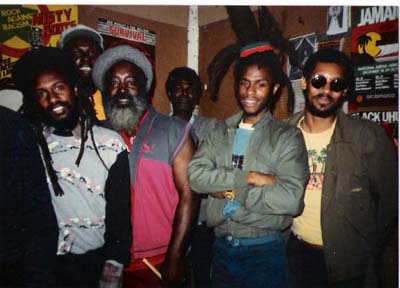| B i o g r a p h y |
 Steel Pulse
is a well-known roots reggae musical band. They originally formed at
Handsworth Wood Boys School, in Birmingham, England and comprised of David Hinds (lead vocals, guitar), Basil Gabbidon (lead guitar, vocals) and Ronald McQueen
(bass). Hinds, as songwriter, has always been the engine behind Steel
Pulse, from their early days establishing themselves in the Birmingham
club scene onwards.
Steel Pulse
is a well-known roots reggae musical band. They originally formed at
Handsworth Wood Boys School, in Birmingham, England and comprised of David Hinds (lead vocals, guitar), Basil Gabbidon (lead guitar, vocals) and Ronald McQueen
(bass). Hinds, as songwriter, has always been the engine behind Steel
Pulse, from their early days establishing themselves in the Birmingham
club scene onwards.
Formed in 1975, their debut release, Kibudu, Mansetta And Abuku arrived on the small independent label Dip, and linked the plight of urban black youth with the image of a greater African homeland. They followed it with Nyah Love for Anchor. Surprisingly, they were initially refused live dates in Caribbean venues in the Midlands because of their Rastafarian beliefs. Aligning themselves closely with the Rock Against Racism organisation and featuring in its first music festival in the spring of 1978, they chose to tour with sympathetic elements of the punk movement, including the Stranglers, XTC etc.: "Punks had a way of enjoying themselves - throw hordes at you, beer, spit at you, that kind of thing". Eventually they found a more natural home in support slots for Burning Spear, which brought them to the attention of Island Records.
Their first release for Island was the Ku Klux Klan 45, a considered tilt at the evils of racism, and one often accompanied by a visual parody of the sect on stage. By this time their ranks had swelled to include Selwyn 'Bumbo' Brown (keyboards), Steve 'Grizzly' Nisbett (drums), Alphonso Martin (vocals, percussion) and Mykaell Riley (vocals). Handsworth Revolution was an accomplished long playing debut and one of the major landmarks in the evolution of British reggae. However, despite critical and moderate commercial success over three albums, the relationship with Island Records had soured by the advent of Caught You (released in the US as Reggae Fever).
Tom Terrell, who would later serve as their manager, was instrumental in masterminding the U.S. premiere of Steel Pulse on the night of Bob Marley's funeral, which was broadcast live around the world from the 9:30 Club, 930 F Street, N.W., Washington, D.C. on May 21, 1981. They switched to Elektra Records, and unveiled their most consistent collection of songs since their debut with True Democracy, distinguished by the Garvey-eulogising 'Rally Round' cut. A further definitive set arrived in Earth Crisis. Unfortunately, Elektra chose to take a leaf out of Island's book in trying to coerce Steel Pulse into a more mainstream vein, asking them to emulate the pop-reggae stance of Eddy Grant. Babylon The Bandit was consequently weakened, but did contain the anthemic "Not King James Version", which was a powerful indictment on the omission of black people and history from certain versions of the Bible.
Their next move was id Hinds of Steel Pulse to MCA for State Of Emergency, which retained some of the synthesized dance elements of its predecessor. Though it was a significantly happier compromise, it still paled before any of their earlier albums. Centennial was recorded live at the Elysee Montmartre in Paris, and dedicated to the hundred year anniversary of the birth of Haile Selassie. It was the first recording since the defection of Alphonso Martin, leaving the trio of Hinds, Nesbitt and Selwyn. While they still faced inverted snobbery at the hands of British reggae fans, in the United States their reputation was growing, becoming the first ever reggae band to appear on the Tonight television show. Their profile was raised further when, in 1992, Hinds challenged the New York City Taxi & Limousine Commission in the Supreme Court, asserting that their cab drivers discriminated against black people in general and Rastafarians in particular.
The Steel Pulse message of hope, education and activism has struck a chord with music lovers worldwide. Their international success has resulted in a Grammy award for their 1986 classic Babylon The Bandit, and nominations for subsequent albums Victims (1991) and Rastafari Cennial (1992). In 1989, the group contributed I Can't Stand it to the soundtrack of Spike Lee's film Do The Right Thing.
In 1994, the group headlined some of the world's biggest reggae festivals including Reggae Sunsplash USA, Jamaican Sunsplash, Japan Splash and Northern California annual Reggae on the River Festival. In 1986, Steel Pulse contributed an ethereal version of Franklin's Tower on Pow Wow Records' Fire on the Mountain: Reggae Celebrates the Grateful Dead compilation. They've recently covered The Police's Can't Stand Losing You for a reggae compilation of Police tunes that will appear on the Ark 21 label. The band is particularly proud of "Rastanthology," a 17-song collection of Steel Pulse classics (the 1996 compilation was released on the band's own Wise Man Doctrine label).
"We're not here to start a physical revolution, we're just here to open everybody's eyes and let them check themselves and continue in a very educational mode to change things on that tip", Hinds explains. "We're losing ourselves and I think it's very important for us to realize that. Too many of our youths have been lost to drugs, or by the gun, or not having the education needed to persevere and move in an upward direction. I think RAGE & FURY will contribute to their enlightenment."